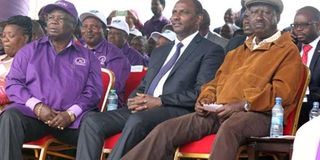Raila Odinga backs Uhuru’s Big Four agenda

From left: Cotu boss Francis Atwoli, Labour Cabinet Secretary Ukur Yattani and opposition leader Raila Odinga at Uhuru Park on May 1, 2018. PHOTO | DENNIS ONSONGO | NATION MEDIA GROUP
What you need to know:
- Mr Odinga described his historic handshake with President Kenyatta as the start of the end of the abrasive, almost violent politics of the opposition.
- The effects of the boycott did not have much effect on mobile telephony companies as subscribers only shifted allegiance for a few days.
- Mr Odinga reinvented his argument of regulated rent charges instead of what he termed unsustainable wage increases.
- The effects of the boycott did not have much effect on mobile telephony companies
Opposition leader Raila Odinga has supported President Uhuru Kenyatta’s Big Four agenda and vowed to rally his MPs behind it.
He also announced an end to boycott of products of companies that Nasa claimed played a role in last year’s disputed elections.
The boycott, dubbed #Resist campaign, was launched last year in November after a protracted electoral crisis that saw Kenya become the first African country, and the fourth in the world, to have its presidential election results annulled
But speaking on Tuesday during Labour Day celebrations at Uhuru Park, Mr Odinga described his historic handshake with President Kenyatta as the start of the end of the abrasive, almost violent politics of the opposition that saw Nasa order its supporters to stop using products from four companies.
RESIST
Nasa had asked its supporters to “resist” products from the Kenyatta family-owned Brookside, giant telecommunications company Safaricom, leading cooking oil manufacturer Bidco, and billionaire Chris Kirubi’s Haco Industries for what it said was abetting the installation of an illegitimate regime.
“Last year, we told our supporters to boycott products from Safaricom, Bidco, Brookside and Haco. Today, I announce the end of the boycott. Our supporters are now free to use products from these companies,” Mr Odinga said.
Though it had been billed as the coalition’s next big thing after the elections, it did not pick up as fast as they had wanted, with some of the Nasa principals suggesting it was a one-man decision.
ALLEGIANCE
The effects of the boycott did not have much effect on mobile telephony companies as subscribers only shifted allegiance for a few days before reverting back to their discarded SIM cards.
Also, in a market flush with multi-SIM handsets, some of those who were sympathetic to the resistance movement still retained an active Safaricom signal even after making competitor networks their primary service providers.
Arguing that Kenya’s unemployment rate is unsustainable and should be addressed, Mr Odinga drummed up support for Big Four agenda – universal healthcare, affordable housing, food security, and manufacturing. “We have a big workforce in our country and most of them are youthful and looking for jobs. This is why we in Nasa are in agreement with Jubilee in matters job creation, universal healthcare, poverty and food security,” he said.
WAGE INCREASES
The opposition leader also found a way to insert the coalition’s agenda into the whole matrix, reinventing his argument of regulated rent charges instead of what he termed unsustainable wage increases.
“Even if we increased salaries today, you will also get an increase in our rent, school fees, fares, and the price of unga. In the end, the raise will be for nothing,” he explained.
“That is why Nasa has called on all of us to talk about the cost of living. If we address the cost of living, then we will not have to be agitating for salary raises that are then gobbled up by high rent, fees, fare, and cost of food.
“We know what bedevils our nation. We know how our people suffered. Now we sat down and decided that we wanted a lasting solution, and that is why we shook hands,” he said.




